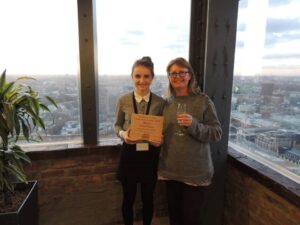Awel Co-op has been crowned the winner of the Wales Award as part of the Rural Community Ownership Awards 2016, the only national awards programme recognising community co-operation around the UK.

Awel members, Kani and Emily Hinshelwood collecting the Plunkett Award
Awel Co-op is building two community wind turbines 15 miles north of Swansea, supplying enough clean energy to power about 2500 homes. All profits from the project will go into further community energy projects. The co-op has undertaken a Share Offer and has already raised £1.56m and is hoping to reach £2m before Christmas.
The Community Ownership Awards are run by Plunkett Foundation, the national charity supporting people to set up and run community co-operatives – businesses that are owned and run democratically by large numbers of people from within their local area – to help overcome issues ranging from isolation and loneliness to poverty.
Dan McCallum, one of Awel’s Directors said “We are very honoured to win the Plunkett Award. It will be fantastic to see our turbines generating electricity which we expect to be before Christmas. Our Share Offer is still open so why not buy a Share as a Christmas present for someone? – you can invest from £50 and we expect to pay a 5% annual return. For more information, visit www.awel.coop.
Awel Co-op competed with shortlisted entries and was crowned the best community owned co-operative in Wales. The winners were announced at a national ceremony in London to an invited audience of over 100 special guests from around the UK.
James Alcock, Head of Frontline at Plunkett Foundation said: The winners of the Rural Community Ownership Awards all represent fantastic examples of community enterprise. The award nominations clearly demonstrated community co-operatives at the top of their game; all the winners fought off seriously tough competition and truly deserve this accolade. We wish them all every success for the future.”
Community co-operatives come in many forms: shops, pubs, bakeries, farms, community hubs, woodlands, broadband projects – the list is endless! They are a business, but trade primarily for the benefit of the local community. Like any business, a community co-operative must be profitable. Due to their focus on the local community, and investing profits back into the business or local area, they are able to succeed where other commercial ventures may fail. For example, around 400 commercial village shops close each year and in the region of 21 pub closures a week, community-owned shops and co-operative pubs not only represent a better form of business, they directly respond to some of the key challenges facing rural communities today such as lack of services and isolation.
Notes to Editors:
About the Community Ownership Awards 2016:
The Community Ownership Awards are about celebrating the most inspiring examples of people in rural areas working together to improve their communities. They are designed to help communities celebrate their own success and learn from each other, and to raise awareness about the co-operative model and community ownership to a wider audience. For more information visit the Awards website at: www.communityownershipawards.com
About Plunkett Foundation:
Plunkett Foundation (www.plunkett.co.uk) helps communities to take control of their challenges and overcome them together. We support people, predominantly in rural areas, to set up and run life-changing community co-operatives; enterprises that are owned and run democratically by large numbers of people in their community. They help people to tackle a range of issues, from isolation and loneliness to poverty, and come in many forms including shops, cafes, pubs and land-based initiatives, and everything in between.
About community co-operatives:
Community co-operatives can come in many forms: shops, pubs, bakeries, farms, community hubs, farmers’ markets, woodlands, broadband projects – the list is endless. They are businesses, but they trade primarily for the benefit of their community. They are controlled by the community, and they have open and voluntary membership, actively encouraging people to get involved by becoming members. They do this by offering shares in the co-operative, the cost of which are set at a level that the majority of people will be able to afford. Click here for more information – https://www.plunkett.co.uk/what-are-community-co-operatives.